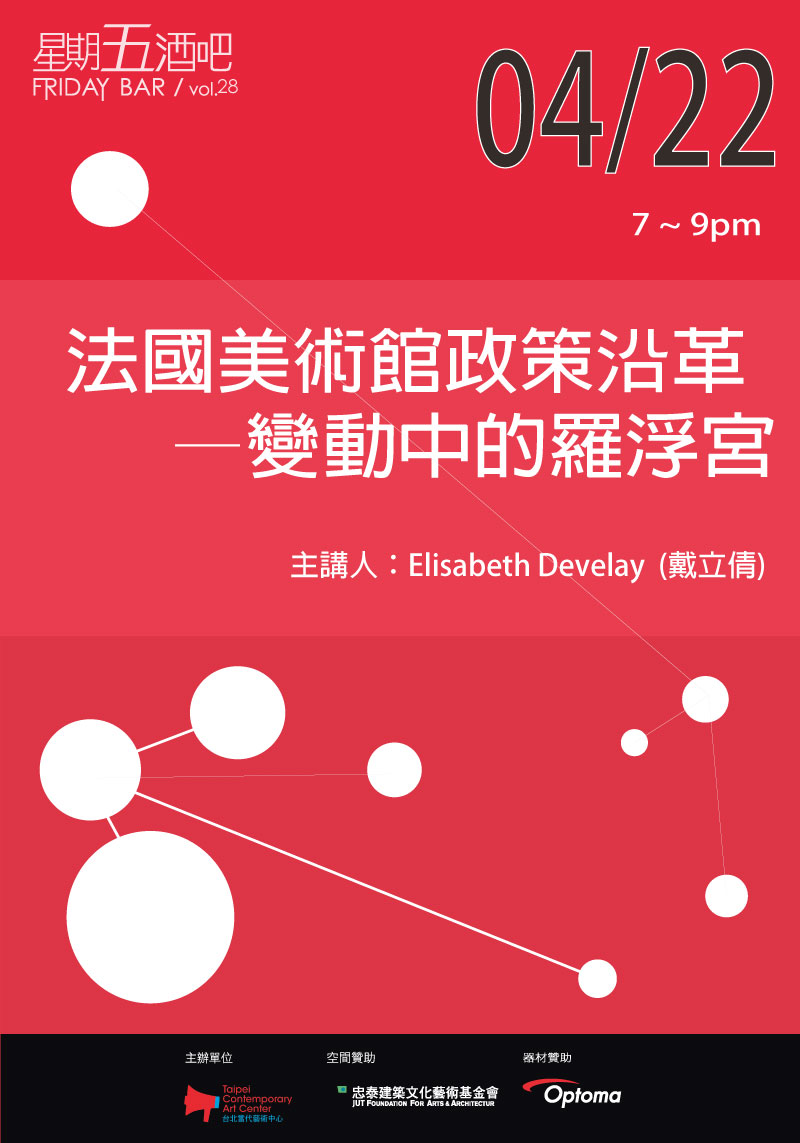04/22星期五酒吧:法國美術館政策沿革—變動中的羅浮宮
The evolution of museum policies in France: Portrait of Louvre–a changing institution in changing world
主講人:Elisabeth Develay(戴立倩)
This speech will be proceeded in English.
現場演講以英文進行。
活動簡介:
羅浮宮,當代文化世界中的指標,最具知名度的美術館,2010年有8千五百萬的參觀人次─毫無疑問是世界上參訪度最高的美術館。每個人都熟知這個名字,期待能去參觀,但我們真的了解這巨大的變色龍?
從蔡明亮的電影,到當代舞蹈及劇場,羅浮宮為當代表演及視覺藝術敞開大門,從巴黎到阿布達比,從北法的朗斯(Lens)到亞特蘭大(Atlanta),它的領地無所不在。在歷史性的收藏與當代的經營管理,在精英與觀眾群間,它似乎站在最前線,保持著彈性及能量。這堪稱是一個無止盡的計劃,我試著去描繪今日的羅浮宮,它的多元面向,試著去衡量這個動態中的龐大機構的永續性與分界點。在最近的法國美術館政策的沿革中,從去中心化政策,到2002年給予美術館高度自治權的新法案,我試著探討擁有特殊規模與預算的羅浮宮,如何可稱為過去十年來法國美術館政策沿革的指標。
演講人介紹:Elisabeth Develay,1997年至1998年就學於昆明的雲南大學,99年畢業於巴黎第7大學的中文系,獲得碩士學位。
就職經歷多半在巴黎及法國駐外文化單位,負責法國各類藝術節、文化項目的規畫及推廣。任職單位包括世界文化館(巴黎),負責該館國際傳統藝術節的宣傳業務,及法國駐蘇格蘭的文化中心,負責法國文化節目規畫,法國文化協會,任職於全球法語國家共同舉辦的藝術節,07年後,擔任法國駐成都總領事館擔任文化專員,現職文建會的技術顧問。
The evolution of museum policies in France: Portrait of Louvre–a changing institution in changing world
True icon of our modern cultural world, the Louvre is one of the most famous museum in the world … and with 8.5 million visitors in 2010 without doubt one of the most visited!
Everyone knows its name, many dream of visiting it, but do we really know this “giant chameleon”?
From Tsai Mingliang’s movie, to contemporary dance and theater, the Louvre opens its doors to the performing arts and contemporary visual art …. From Paris to Abu Dhabi, through Lens and Atlanta, he seems to have conquered the ubiquitous … Between historical collections and modern management, between elites and new audiences, it seems to be able to be on every front, both flexible and powerful.
Modestly as it is an inexhaustible subject, I will try to portray the Louvre today, and the diversity of its faces, seeking to qualify, in this huge institution in motion, the continuities and breakpoints. In the context of the recent evolution of the French museum policy, from the decentralisation to the 2002 legislation and the greater autonomy given to museums, I will explore how the Louvre, though unique by its size and its budget, is emblematic of the main changes that occurred in the french museums over the past decade.

